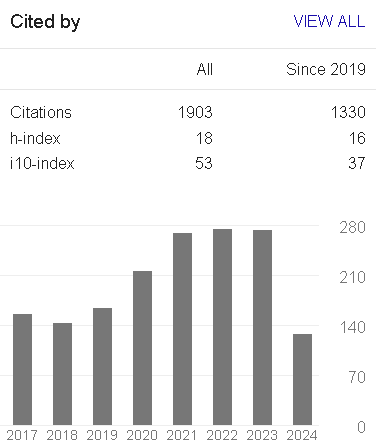Biometric Systems: Evolution, Applications and Technology
Biometric Systems: Evolution, Applications and Technology
Keywords:
Biometrics, Fingerprints, False Acceptance Rate, False Rejection Rate, Authentication ProcessAbstract
Biometrics is a futuristic and yet a current technology, with an ever bigger role in the future. Biometrics will not be able to replace passwords, swipe cards, or pin numbers etc., rather work with them in enhancing security in a simple, reliable, and cost effective way. Biometrics revolution has led to over 1 billion people being already covered by biometric identification programs in the lower middle income countries. Biometric system covers application pertaining to Authentication, Transaction, Access Privilege and it relies on Credentials, Demographics and Sensor data to get a match score with certain degree of confidence using biometric recognition tools. Biometrics systems are extremely useful due to its traits such as security (stop unauthorised person from getting access), convenience (No need to carry credentials like Identity proofs etc.), Audit trail (creates an audit trail for say bank vault access etc.), Fraud prevention (verifying if credit card holder is rightful owner at PoS), and de-duplication (One person, one documentation). India’s well known and ambitious pan-India project of Adhaar Card is one good example relying on biometric application for generating unique identification and de-duplication for wide ranging government schemes.
References
C. M. Bishop, Pattern Recognition and Machine Learning, Springer, 2007.
R. O. Duda, P. E. Hart, and D. G. Stork, Pattern Classification and Scene Analysis, John Wiley and Sons, New York, 2001.
F. Roli, L. Didaci, and G. L. Marcialis, ‘Template co-update in multimodal biometric systems’, in Advances in Biometrics, pp. 1194–1202, (2007).
P. J. Flynn, K. W. Bowyer, and P. J. Phillips, ‘Assessment of Time Dependency in Face Recognition: An Initial Study’, in LNCS 2688, 4th Int’l. Conf. Audio- and Video-Based Biometric Person Authentication (AVBPA 2003), pp. 44–51, Guildford, (2003).
Anil Jain, Michigan State University, ‘50 years of Biometric Research: Almost Solved, the Unsolved and the Unexplored’, 2013.
Corinne Fredouille, Johnny Mari´ethoz, C´edric Jaboulet, Jean Hennebert, Chafik Mokbel, and Fr´ed´eric Bimbot, ‘Behavior of a bayesian adaptation method for incremental enrollment in speaker verification’, in ICASSP2000 - IEEE International Conference on Acoustics, Speech, and Signal Processing, Istanbul, Turkey, (June 5–9 2000).
X. Jiang and W. Ser, ‘Online fingerprint template improvement’, IEEE Tran. Pattern Analysis and Machine Intelligence, 24(8), 1121–1126, (2002).
X. Liu, T. Chen, and S. M. Thornton, ‘Eigenspace updating for non-stationary process and its application to face recognition’, Pattern Recognition, 36(9), 1945–1959, (September 2003).
N. Poh, G. Heusch, and J. Kittler, ‘On Combination of Face Authentication Experts by a Mixture of Quality Dependent Fusion Classifiers’, in LNCS 4472, Multiple Classifiers System (MCS), pp. 344–356, Prague, (2007).
N. Poh and J. Kittler, ‘A Method for Estimating authentication Performance Over Time, with Applications to Face Biometrics’, in 12th IAPR Iberoamerican Congress on Pattern Recognition (CIARP), pp. 360–369, Via del Mar-Valparaiso, Chile, (2007).
D. A. Reynolds, T. Quatieri, and R. Dunn, ‘Speaker Verification Using Adapted Gaussian Mixture Models’, Digital Signal Processing, 10(1–3), 19–41, (2000).
X. Zhu, ‘Semi-supervised learning literature survey’, online publication, University of WisconsinMadison, (2008).
Downloads
Published
How to Cite
Issue
Section
License
Copyright (c) 2024 COMPUSOFT: An International Journal of Advanced Computer Technology

This work is licensed under a Creative Commons Attribution 4.0 International License.
©2023. COMPUSOFT: AN INTERNATIONAL OF ADVANCED COMPUTER TECHNOLOGY by COMPUSOFT PUBLICATION is licensed under a Creative Commons Attribution 4.0 International License. Based on a work at COMPUSOFT: AN INTERNATIONAL OF ADVANCED COMPUTER TECHNOLOGY. Permissions beyond the scope of this license may be available at Creative Commons Attribution 4.0 International Public License.


